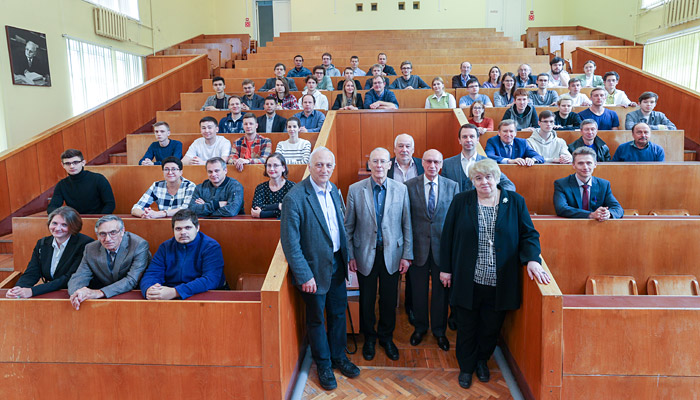
Electronic english version since 2022 |
The newspaper was founded in November 1957
| |
New academic year started at MSU Branch in Dubna
On 2 September, as part of the launch of the opened MSU Branch in Dubna, students of the Departments of Elementary Particle Physics (EPP) and Fundamental Nuclear Interactions (FNI) met with their scientific advisors, leaders and lecturers of the Departments and the branch, as well as representatives of the JINR Directorate.
The students were addressed by Head of the FNI Department, JINR Director Grigory Trubnikov, Head of the EPP Department, Scientific Leader of the Institute Victor Matveev, Director of the Dubna Branch of MSU and Director of the SINP MSU Eduard Boos, Deputy Directors of the Branch Aleksander Olshevsky and Tatyana Tetereva, and Associate Professor of the EPP Department Vladimir Leontyev.
RAS Academician Grigory Trubnikov gave an overview lecture to students about the city of their study and work, the history of the Joint Institute for Nuclear Research, and its achievements in global science. JINR Director highlighted the main directions of the scientific programme of the Institute and presented research of each JINR Laboratory. In particular, he noted that MSU and JINR are leaders in Russia in terms of scientometric indicators of publication activity.
"I wish each of you, first and foremost, good luck with finding a supervisor," he said at the end of his speech. "It is very important to work with an active, energetic supervisor who does not let you get complacent. The second biggest stroke of luck is getting into the right team. It does not have to be a large collaboration of 100 to 200 people. It can be a small group, but a group you would like to come to work with every day."
Grigory Trubnikov shared plans to establish three to four more departments at the Branch, including on theoretical physics, information technologies, and radiochemistry.

RAS Corresponding Member Eduard Boos noted in his welcoming speech that the establishment of the MSU Branch in the Dubna science city on the basis of the existing branch of the SINP MSU was a timely decision. "On the initiative of Rector of Moscow State University Victor Sadovnichy and Director of the Joint Institute for Nuclear Research Grigory Trubnikov, it was decided to make a full-fledged branch of MSU in Dubna. This corresponded to the social order to stimulate an influx of more young people to provide an extensive scientific programme of the Joint Institute. This programme overlaps very closely with the MSU programme and there are great prospects for this collaboration."
RAS Academician Victor Matveev addressed the students of the new MSU Branch with parting words, "You have come to a place where a megascience research centre actually operates. Megascience means that you have to rely on ideas that have not just been initiated but have been analysed and evaluated by the international scientific community in order to implement projects. When you come here, you join a circle of people who are united by the most cutting-edge ideas."
Professor Aleksander Olshevsky presented information about the history of the Dubna Branch of the SINP MSU, which was founded in 1961, and its graduates. Thus, between 1963 and 2015, more than 800 graduate students and more than 200 postgraduate students were trained, 70% of whom continued their work in science. From 2016 to 2021, this educational institution existed as the Department of Nuclear Research of the SINP MSU. During this period, 39 people graduated from the Master's programme, 24 graduates went on to work in their speciality and 17 were employed at JINR. "A high proportion of graduates kept on working in their speciality, which demonstrates serious motivation of students gaining their first scientific experience at JINR," Aleksander Olshevsky highlighted.
He also spoke about the concept of the new MSU Branch, its training plans, and organizational activities.
Now 31 students will continue their studies in the new conditions at the Dubna Branch of MSU, 15 out of whom have been enrolled this year: 10 third-grade students, 1 fourth- grade student, and 4 first- grade master's students.
The specialisation of the Branch departments is focused on the most important and priority part of JINR theoretical and experimental research.
Plans for the upcoming years is to triple the number of physics specialists by offering master's and specialist degrees, while at the same time maintaining training at the existing Faculty of Physics in Dubna, and to prepare training programmes in other fields in line with the Institute's scientific topics.
The branch has prepared and approved new educational programmes to be introduced from the academic year 2023/2024: Elementary Particle Physics and Fundamental and Applied Nuclear Physics. Each programme has five budgetary places so far.
Changes have been made to the educational system within the Department of Elementary Particle Physics and the new Department of Fundamental Nuclear Interactions.
The educational process for students with disabilities is being prepared and the refurbishment of the study building is almost completed. MSU services have started developing design and estimate documentation for an overall renovation of the Branch's dormitory.
The Dubna Branch will use the opportunities of JINR as an international organization to establish connections and use the best educational practices through participation in international scientific projects to train personnel for basic research in the JINR Member States. A unique feature of the training at the Branch will be to expose students to a special professional environment, based on world-class scientific infrastructure, which guarantees the demand for graduates in all the JINR Laboratories.
At the end of the event, students of the Branch visited the exhibition JINR Basic Facilitiesin the Cultural Centre "Mir" and the Veksler and Baldin Laboratory of High Energy Physicswhere the NICA accelerator complex is being constructed.
www.jinr.ru